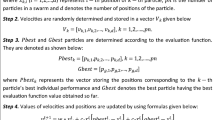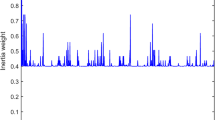Abstract
Particle swarm optimization (PSO), like other evolutionary algorithms is a population-based stochastic algorithm inspired from the metaphor of social interaction in birds, insects, wasps, etc. It has been used for finding promising solutions in complex search space through the interaction of particles in a swarm. It is a well recognized fact that the performance of evolutionary algorithms to a great extent depends on the choice of appropriate strategy/operating parameters like population size, crossover rate, mutation rate, crossover operator, etc. Generally, these parameters are selected through hit and trial process, which is very unsystematic and requires rigorous experimentation. This paper proposes a systematic based on Taguchi method reasoning scheme for rapidly identifying the strategy parameters for the PSO algorithm. The Taguchi method is a robust design approach using fractional factorial design to study a large number of parameters with small number of experiments. Computer simulations have been performed on two benchmark functions—Rosenbrock function and Griewank function—to validate the approach.
Similar content being viewed by others
References
Bagchi, T.P., 1993. Taguchi Methods Explained—Practical Steps to Robust Design. Prentice Hall of India.
Eberhart, R.C., Kennedy, J., 1995. A New Optimizer Using Particle Swarm Theory. Proceedings of IEEE the 6th Symposium on Micro Machine and Human Centre, p.39–43.
Eberhart, R.C., Shi, Y., 2001. Particle Swarm Optimization: Developments, Applications and Resources. Proceedings of IEEE Congress on Evolutionary Computation, Seoul, Korea, p.81–86.
Kennedy, J., Eberhart, R.C., 1995. Particle Swarm Optimization. Proceedings of IEEE Conference on Neural Networks. Perth, Australia, p.1942–1948.
Kennedy, J., Eberhart, R.C., 2001. Swarm Intelligence. Morgan Kaufmann.
Parsopoulos, K.E., Vrahatis, M.N., 2002. Recent approaches to global optimization problems through particle swarm optimization. Natural Computing, 1(2–3):235–306. [doi:10.1023/A:1016568309421]
Ross, P.J., 1996. Taguchi Techniques for Quality Engineering. McGraw Hill.
Scheffe, H., 1999. The Analysis of Variance. Wiley Interscience Publication, John Wiley and Sons.
Shi, Y., Eberhart, R.C., 1998. A Modified Particle Swarm Optimizer. Proceedings of IEEE International Conference on Evolutionary Computation, p.69–73. [doi:10.1109/ICEC.1998.699146]
Shi, Y., Eberhart, R.C., 1999. Empirical Study of Particle Swarm Optimization. Proceedings of Congress on Evolutionary Computation, p.1945–1950.
Shi, Y., Eberhart, R.C., 2001. Fuzzy Adaptive Particle Swarm Optimization. Proceedings of Congress on Evolutionary Computation, p.101–106.
Taguchi, G., Chowdhury, S., Wu, Y., 2005. Taguchi Quality Engineering Handbook. John Wiley and Sons.
Turner, J.R., Thayer, J.F., 2001. Introduction of Analysis of Variance—Design, Analysis and Interpretation. Sage Publications.
Xie, X.F., Zhang, W.J., Yang, Z.L., 2002. Adaptive Particle Swarm Optimization on Individual Level. International Conference on Signal Processing (ICSP 2002), p.1215–1218. [doi:10.1109/ICOSP.2002.1180009]
Author information
Authors and Affiliations
Rights and permissions
About this article
Cite this article
Khosla, A., Kumar, S. & Aggarwal, K. Identification of strategy parameters for particle swarm optimizer through Taguchi method. J. Zhejiang Univ. - Sci. A 7, 1989–1994 (2006). https://doi.org/10.1631/jzus.2006.A1989
Received:
Accepted:
Published:
Issue Date:
DOI: https://doi.org/10.1631/jzus.2006.A1989




